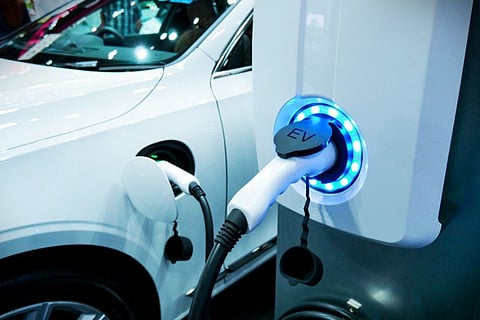Pakistan approves first electric vehicles policy
Main goal is to cut emissions and tackle climate change

Islamabad: Pakistan’s federal cabinet has approved the first-ever national Electric Vehicles (EV) policy in a bid to tackle effects of climate change and offer affordable transport.
In the first phase, the government will focus on converting 30 per cent of total number of vehicles, mainly cars and rickshaws, into EVs, said Adviser to Prime Minister on Climate Change Malik Ameen Aslam. The press conference was held after the policy was approved in a cabinet meeting chaired by Prime Minister Imran Khan.
“PM Imran Khan has special interest in green and sustainable development, which is why the Climate Change Ministry was tasked to come up with an Electric Vehicle Policy,” Aslam said.
Describing the details of the policy, he said that local car manufacturers had already completed most of the preliminary work, adding that he was surprised to see the acknowledgment by the manufacturers who are waiting to roll out their electric vehicles into the market. The target set for next four years is to convert 100,000 cars and 500,000 two and three wheeler vehicles to EVs.
Reducing cost while protecting environment
One of the key objectives of the policy is to offer affordable transportation to the people as the cost of electric vehicles is much lower compared to petrol, diesel, compressed natural gas (CNG) or other fuels. Another major purpose of introducing EVs is to reduce greenhouse gas emissions. “In developed countries, the greenhouse gas emissions from vehicles is around 20 per cent whereas in Pakistan it is 40 per cent, which the government aims to bring down with the introduction of electric cars, trucks, rickshaws, in order to reduce pollution and smog,” Aslam added.
Green Revolution to reduce imports, boost local industry
With the green revolution, Pakistan also hopes to reduce dependence on oil imports that could help save $2billion, incentivise the local car industry and create jobs. More than 3,000 CNG stations that have been shut due to gas shortage would be converted to EV charging stations. Pakistan is also planning to set up special units of electric car manufacturing in the Special Economic Zones being established under the China-Pakistan Economic Corridor (CPEC).
Collaboration and incentives
Climate and energy experts have hailed the policy but some are sceptical. “It is certainly good news but we have not seen much discussion on technical aspects and implementation framework,” said Asad Mahmoud, representative of National Energy Efficiency and Conservation Authority. He advised the government to involve all relevant stakeholders from energy to automobile industries for effective results.
Ali Amjad, an EV enthusiast with a background in engineering, said the primary focus should be cars and public transport because “converting bikes to electric vehicles has not been very efficient globally”. Amjad told Gulf News: “The catchphrase to attract people should be ‘save money’, rather than ‘save the environment because, let’s be honest, for most people, climate change isn’t a strong enough motivation to switch to EV. High speed, enhanced range, acceleration and comfort are the things the EV companies need to market to general public.”
Electricity shortages
But how can Pakistan switch to electric vehicles when it faces electricity shortfall? A 2019 report titled ‘Electric Vehicles in Pakistan: Policy Recommendations’ says by 2025, an excess of 15,000 MW peak generation capacity will be available in the system to spare for EVs and claims that “almost 500,000 EVs can be fully charged daily with a supply of just under 1000 MWs”. Researchers said introducing EVs in Pakistan can solve present and imminent problems of a number of sectors, including transportation, environment, economy and power.
Key Facts
• Target set to convert 30 per cent of vehicles into EVs
• 3,000 CNG stations to be transformed to EV charging stations
• 100,000 cars and 500,000 bikes and rickshaws to be converted to EVs in next 4 years
Sign up for the Daily Briefing
Get the latest news and updates straight to your inbox

